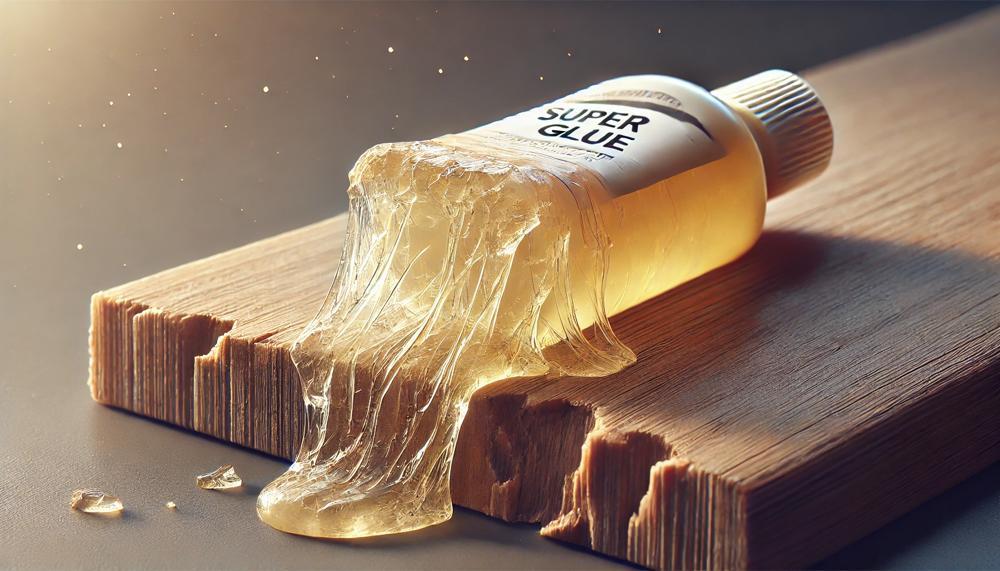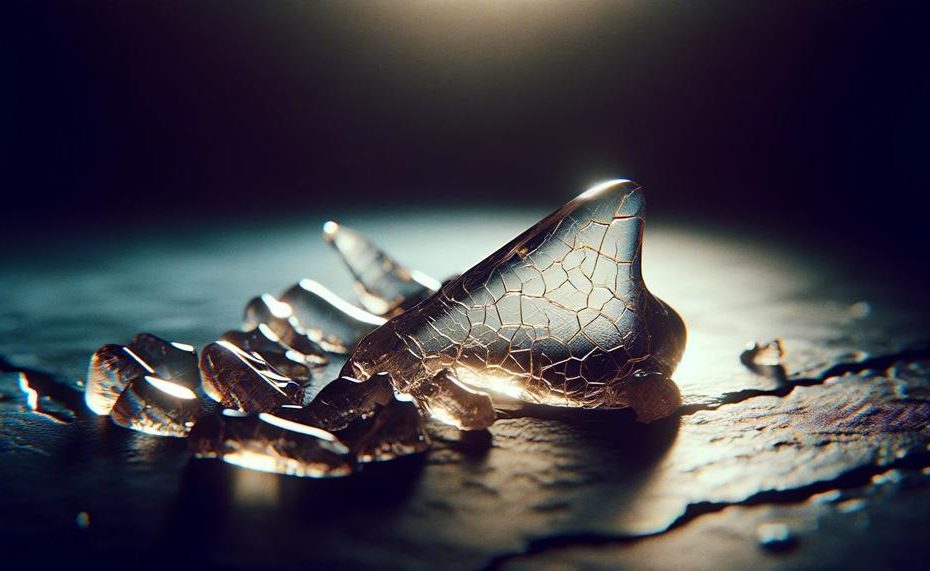No, dried super glue generally does not pose a significant health risk if it simply comes into contact with your skin.
However, this doesn’t mean you should ignore the potential hazards associated with its use. While dried super glue isn’t toxic, handling it improperly can lead to some uncomfortable situations.
When dealing with super glue, it’s important to be aware of the following points:

- Skin Irritation: Direct contact can cause mild irritation, especially for those with sensitive skin.
- Allergic Reactions: Some individuals might experience an allergic response, leading to redness or itching.
- Fumes: Inhaling the fumes before the glue dries can be harmful, causing respiratory irritation.
- Accidental Ingestion: If accidentally swallowed while wet, super glue can cause serious internal damage and requires immediate medical attention.
By taking a few precautions, like working in a well-ventilated area and using protective gloves, you can safely navigate the use of super glue without worry. Remember, while dried super glue on your skin might be an inconvenience, it’s the wet glue and fumes that you should be more cautious about.
Table of Contents
What is Super Glue?
Super Glue, scientifically known as cyanoacrylate glue, is a potent adhesive distinguished by its unique chemical composition and curing process. Unlike most adhesives, which are water-based, Super Glue is formulated from acrylic resin.
This distinction enables it to cure upon contact with moisture, including the humidity in the air. The result is a rapid and robust bond, making it a preferred choice for various applications.
| Attribute | Super Glue (Cyanoacrylate) | Other Types of Glue |
| Composition | Acrylic resin, cures with moisture | Typically water-based or solvent-based |
| Drying Time | Instant, within seconds | Varies, can range from minutes to hours |
| Strength | Extremely strong, forms a durable bond | Varies, often less strong than cyanoacrylate |
| Applications | Versatile: plastics, metals, ceramics, glass, and more | Specific: wood, paper, fabric, or general purposes |
| Safety Considerations | Fumes can be harmful; skin contact can cause irritation | Generally less harmful, but varies by type |
Super Glue’s remarkable strength and versatility stem from its unique properties. It can bond a wide range of materials, from plastic and metal to ceramics and glass. This versatility has even led to its use in unexpected scenarios, such as repairing the skulls of baby penguins in zoos or fixing the eggs of birds.
However, the potent nature of Super Glue comes with safety precautions. The fumes can be irritating, necessitating the use of a well-ventilated workspace and protective gear.
Additionally, if ingested, it can cause severe irritation and burns in the digestive tract, requiring immediate medical attention. Direct skin contact can also result in irritation or allergic reactions.
Is Super Glue Toxic When Dry?
Yes, it is generally safe to handle dried super glue without protection, but there are a few precautions to consider. Once dried, super glue forms a hard, stable bond that is not inherently toxic. However, there are some potential risks and guidelines to keep in mind to ensure safety.
| Potential Risks | Precautions | Recommended Actions |
| Skin Irritation | Avoid prolonged contact with skin | Wash hands thoroughly after handling |
| Chemical Burns | Do not attempt to peel dried glue off skin forcefully | Soak affected area in warm, soapy water or use acetone-based nail polish remover |
| Eye Damage | Keep glue away from eyes | If contact occurs, rinse eyes with plenty of water and seek medical attention |
| Inhalation of Fumes | Ensure proper ventilation when applying glue | Use in well-ventilated areas |
| Accidental Ingestion | Keep out of reach of children and pets | Seek medical advice immediately if ingested |
Once dried, the primary component of super glue, cyanoacrylate, is relatively inert. However, the adhesive can still cause minor skin irritation or sensitivity in some individuals. Direct contact with large amounts of dried glue should be avoided as a precaution. In case of accidental skin contact, gently washing the area with soap and water usually suffices.
How to Handle Super Glue Correctly
Personal Protective Equipment (PPE)
- Gloves: Wear disposable gloves to protect your skin from accidental contact.
- Eyewear: Use protective goggles to shield your eyes from splashes.
Ventilation
- Work Area: Ensure you are in a well-ventilated area. Fumes from super glue can irritate the eyes, nose, and throat.
Handling Techniques
- Application: Apply super glue in small amounts. Excess glue can lead to unintended bonding and increased fume production.
- Control: Use applicators or brushes for precise application.
First Aid Measures
- Skin Contact: If glue gets on your skin, do not pull it apart. Soak the area in warm, soapy water or use acetone (nail polish remover) to dissolve the adhesive.
- Eye Contact: If super glue enters the eye, flush with water immediately and seek medical attention.
- Ingestion: If ingested, seek immediate medical assistance. Do not induce vomiting.
Storage and Disposal
- Storage: Keep super glue in a cool, dry place away from direct sunlight and heat. Ensure it is out of reach of children and pets.
- Disposal: Do not pour super glue down the drain or throw it in regular household waste. Follow local waste management guidelines for proper disposal.
General Safety Tips
- Medical Use: Do not use super glue for medical purposes. Use designated medical-grade adhesives instead.
- Pet Safety: Keep super glue away from pets, as ingestion or contact can be harmful.
What to Do in Case of Super Glue Exposure
If exposed to super glue, it’s vital to act swiftly to prevent injury. Follow these steps:
Skin Contact
:
- Do Not Panic: Stay calm to avoid making the situation worse.
- Avoid Peeling: Do not try to peel the glue off forcefully; this can damage your skin.
- Soak in Warm Soapy Water: Immerse the affected area in warm, soapy water for several minutes.
- Gently Rub: After soaking, gently rub the area to loosen the glue.
- Use Acetone: If the glue persists, apply a small amount of acetone-based nail polish remover. Be cautious with acetone on sensitive skin areas.
- Moisturise: After removal, moisturise the area to soothe the skin.
Eye Exposure
:
- Do Not Touch: Avoid rubbing or touching your eyes.
- Rinse Thoroughly: Rinse the eyes with lukewarm water immediately and continuously for at least 15 minutes.
- Seek Medical Attention: Keep your eyes closed and seek emergency help right away.
Inhalation of Fumes
:
- Move to Fresh Air: Go to a well-ventilated area immediately.
- Seek Medical Help: If you experience any breathing difficulties or irritation, contact a healthcare professional.
Ingestion
:
- Do Not Induce Vomiting: Avoid trying to vomit.
- Drink Water: Drink plenty of water to help dilute the substance.
- Get Medical Help: Contact poison control or go to the emergency room immediately.
General Tips
:
- Protective Gear: Always wear protective gloves and work in a well-ventilated space when handling super glue.
- Consult a Physician: If in doubt or if an allergic reaction occurs, seek advice from a healthcare professional.
Preventive Measures
To prevent potential harm from dried super glue, consider these steps:
- Proper Storage: Store super glue in a cool, dry place. Ensure the cap is tightly sealed to prevent air from entering and drying out the glue.
- Use Sparingly: Apply the glue in thin layers. This not only prevents it from drying out quickly but also ensures a stronger bond.
- Seal After Use: Always close the cap tightly after each use to keep the glue from drying out.
- Safety Precautions: Wear protective gloves and eyewear when handling super glue. This prevents skin contact and protects your eyes from accidental splashes.
- Ventilation: Work in a well-ventilated area, especially when using solvents or nail polish remover to handle dried super glue. This helps to avoid inhaling potentially harmful fumes.
- Dispose Properly: If the glue has dried and cannot be reactivated, dispose of it appropriately. This prevents accidental exposure to dried glue, which can be difficult to remove from skin or surfaces.
Conclusion
Dried super glue, while generally safe, does come with its own set of precautions. It might not be toxic, but handling it carelessly can still cause discomfort. Here’s a concise rundown on what to be mindful of:
- Skin Contact: Direct contact with dried super glue can cause mild skin irritation, especially for those with sensitive skin. It’s always best to avoid prolonged exposure and wash your hands thoroughly after handling.
- Allergic Reactions: Some people might experience redness or itching due to an allergic response. If you know you have sensitive skin, take extra care when using super glue.
- Fume Inhalation: The fumes from super glue can be harmful before it dries. Ensure you’re working in a well-ventilated area to avoid respiratory irritation.
- Accidental Ingestion: Ingesting super glue, particularly before it dries, can cause serious internal damage. Always seek immediate medical attention if this happens.
- Proper Handling: To minimize risks, wear disposable gloves and protective eyewear, and apply the glue in small amounts. If super glue gets on your skin, don’t peel it off forcefully; instead, soak the area in warm, soapy water or use acetone-based nail polish remover.
While dried super glue isn’t a health hazard, the key is in handling it responsibly.






